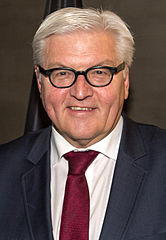
Germany’s foreign minister warned Sunday against racism and xenophobia, at a ceremony marking 70 years since the liberation of the Nazi concentration camp Sachsenhausen near Berlin.
Frank-Walter Steinmeier joined Holocaust survivors and other guests at the site which was built while Hitler celebrated the 1936 Olympic Games, and where tens of thousands of Jews and other inmates died.
Steinmeier said Germany had an enduring responsibility not to forget its horrific past, which meant it must “stand against injustice, against any form of xenophobia and discrimination”.
He pointed to recent anti-foreigner attacks, cases of arson of refugee centres and anti-Islamic street protests as the number of asylum seekers rises sharply.
“Do we want to live in a country where there is still anti-Semitism and exclusion? Where asylum homes are set on fire? Where a young man is beaten up on a Berlin subway because he is a Jew?” asked Steinmeier.
“A country where people take to the streets in packs to rant dull slogans against anything they see as foreign? Is that our country?… This is not the open country which the vast majority of Germans want.”
Steinmeier said Sachsenhausen, 35 kilometres (20 miles) north of the capital, “exemplifies the monstrosity of a regime that institutionalised horror”, according to a copy of his speech sent to AFP.
More than 200,000 people were incarcerated there, and tens of thousands were murdered or died of starvation, disease, forced labour or a death march shortly before the end of the war.
Only about 3,000 people were alive when the camp was liberated by Soviet and Polish troops on April 22 and 23, 1945.
“The crimes of the Nazi regime are without equal,” the minister said. “They make us shudder — the murder of millions of Jews in Europe, the crime against humanity that is the Shoah.
“The killing and persecution of Roma and Sinti, homosexuals, the disabled, of political activists, of people who thought, looked or prayed differently or otherwise acted in contravention of what the Nazis dictated.”
Steinmeier said that, in view of such horrors, it “seems like a miracle” that Germany and Israel now have a “deep friendship”, marked by 50 years of diplomatic ties and a renewed “flowering of Jewish life” in Germany.
Education Minister Johanna Wanka also spoke at a ceremony at the Ravensbrueck concentration camp, also near Berlin, where more than 25,000 women and 2,500 men died, many through forced labour, in medical experiments and on a final death march.
On April 30, 1945, the Soviet Red Army liberated Ravensbrueck, finding only about 2,000 people left alive.



